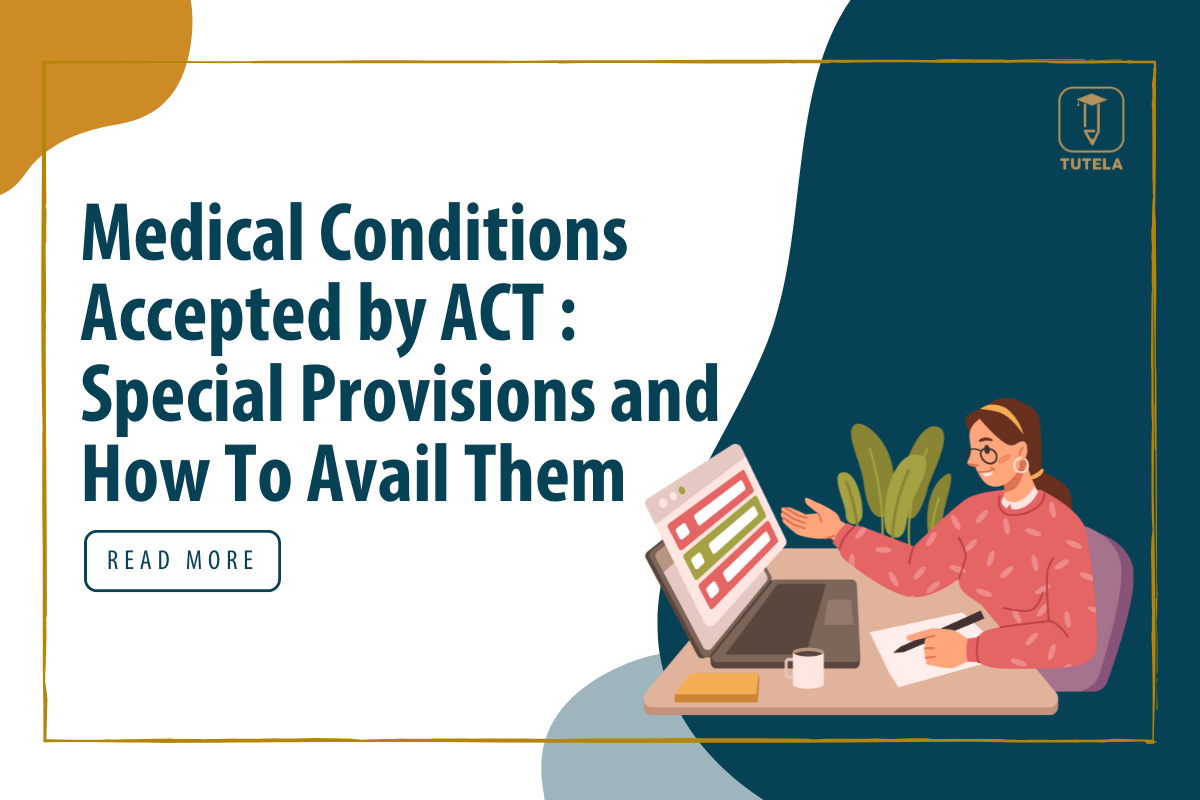
ACT approves provisions like extra time, and special test-taking rooms with individual invigilation, for examinees with disabilities.
Medical Conditions covered
- Attention Deficit/Hyperactivity Disorder (ADHD)
- Psychiatric Disorders—Mood or Anxiety Disorders or Serious and Persistent Mental Illness
- Visual Impairment
- Hearing Impairment
- Autism, Asperger’s Disorder, Pervasive Developmental Disorder, or Autism Spectrum Disorder
- Speech and Language Disorders
- Traumatic Brain Injuries
- Learning Disabilities
The specific requirements for each of these ailments can be obtained on the ACT website.
Following pointers should be kept in mind while applying for special accommodation requests on the ACT: BASIC DOCUMENTS REQUIRED
- All the documentation/proofs must be made by a qualified professional whose credentials are appropriate to the disability. The name, title, and professional credentials (e.g., degrees, areas of specialization, license or certification, employment) must be clearly stated in the documentation.
- The condition mentioned should be currently – diagnosed or reconfirmed within 3 academic years of the date of the request
- If your school knows about your condition, the concerned school officials must provide one of the following documents.
- In case accommodations have been provided by the school, the special education service or accommodations pages from a current Individual Education Program (IEP), Section 504 plan, or official accommodations plan need to be produced. Else, if case no accommodations have been provided, then a detailed explanation of why no accommodations were used in the past and why accommodations are needed at this time needs to be provided.
- In addition, complete diagnostic documentation may be required to substantiate a need for accommodations on the ACT, particularly when accommodations have been recently provided to the examinee
PROCEDURES FOR REQUESTING ACCOMMODATIONS ON THE ACT
- The examinee must work with a school official to submit a ‘request for accommodations’ in the Test Accessibility and Accommodations System (TAA). TAA can be accessed by school officials only at the following website: https://readiness.act.org. Please note that registration and accommodations request deadlines apply
- If the examinee is under 18, the examinee, or the examinee’s parent or guardian must sign a statement authorizing the release of diagnostic information by school officials to ACT. Without this release, the review can go no further.
- The request may be strengthened by the submission of letters from teachers discussing specific ways in which the condition affects the examinee in the classroom and in testing situations or submission of completed Teacher Survey Formstic information
HOW IS YOUR REQUEST PROCESSED?
ACT will make the final decision regarding appropriate and reasonable testing accommodations on the ACT for individuals with documented disabilities. The process for the review of accommodations requests is explained below.
- STEP 1: Requests and supporting documentation are submitted to ACT via the Test Accessibility and Accommodations System (TAA) by a school official.
- STEP 2: ACT receives requests and documentation. ACT analysts review requests and provide a Decision Notification in TAA.
- STEP 3: The school official/test coordinator reviews each Decision Notification and edits requests for reconsideration using TAA, if applicable.
- STEP 4: ACT receives additional information and reconsiders the request, and provides an updated Decision Notification in TAA.
Note: If a reconsideration request is submitted after the applicable deadline, decisions will not be available for the scheduled test event.
HOW WILL YOU KNOW THAT YOUR ACCOMMODATION REQUEST HAS BEEN APPROVED?
After ACT reviews a request for ACT-approved accommodations, an examinee-specific Decision Notification is created in TAA. When the notification is available, the individual who submitted the request will receive an email. The notification contains the following data fields:
- Examinee’s name
- Examinee’s personal identification number (PIN) for TAA
- Accommodations approved (including any special authorizations), or not approved, as applicable
- Reason accommodations are not approved, if applicable
